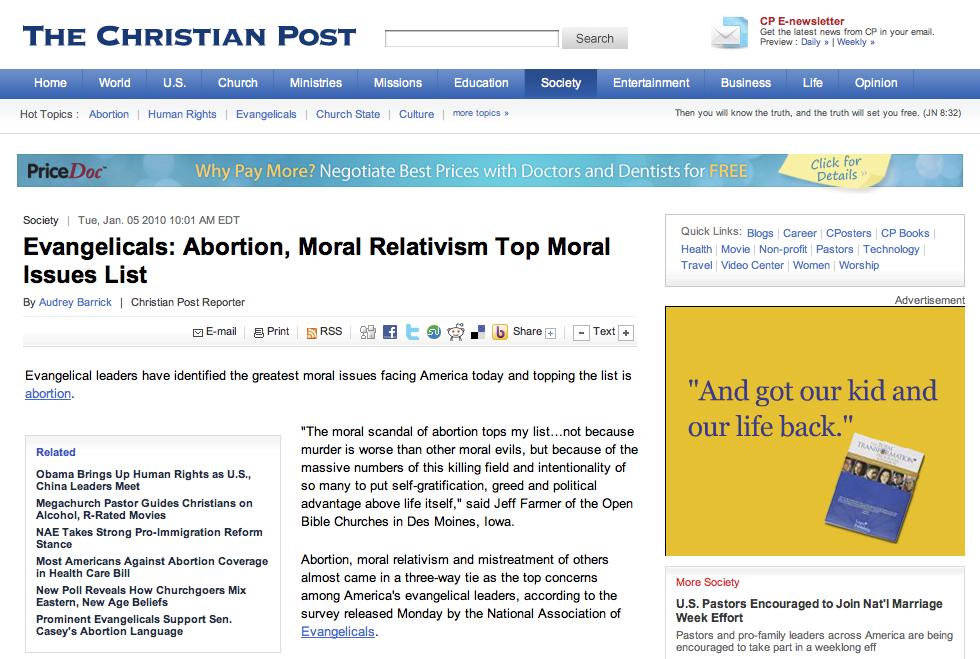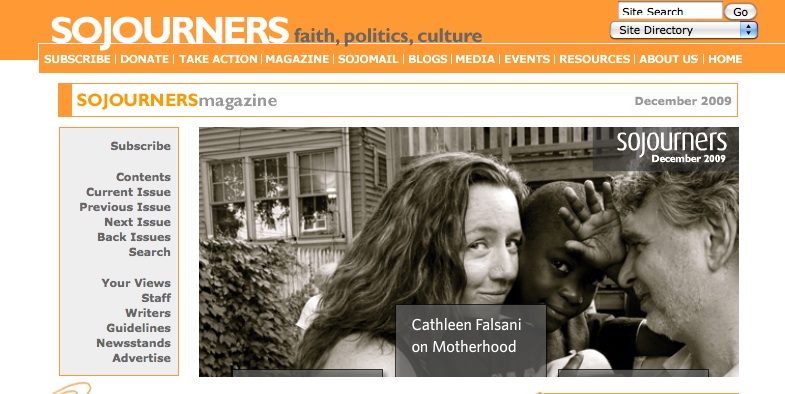BOSTON GLOBE: Pastor Joel C. Hunter Comments on President Obama's Spiritual Life
 WASHINGTON - He named a best-selling book after a pastor’s sermon and was outspoken as a candidate about the value of faith in public life. He infused stump speeches with phrases like “I am my brother’s keeper,’’ and made his journey to Christianity a central theme of the life story he shared with voters.
WASHINGTON - He named a best-selling book after a pastor’s sermon and was outspoken as a candidate about the value of faith in public life. He infused stump speeches with phrases like “I am my brother’s keeper,’’ and made his journey to Christianity a central theme of the life story he shared with voters.
But since President Obama took office a year ago, his faith has largely receded from public view. He has attended church in the capital only four times, and worshiped half a dozen times at a secluded Camp David chapel. He prays privately, reads a “daily devotional’’ that aides send to his BlackBerry, and talks to pastors by phone, but seldom frames policies in spiritual terms.
The greater privacy reflects not a slackening of devotion, but a desire to shield his spirituality from the maw of politics and strike an inclusive tone at a time of competing national priorities and continuing partisan division, according to people close to the White House on faith issues.
“There are several ways that he is continuing to grow in his faith, all of them - or practically of all them - he’s trying to keep as private and personal as possible so they will not be politicized,’’ said Pastor Joel C. Hunter, who is part of an inner circle of pastors the president consults by phone for spiritual guidance.
But the shift has drawn notice from some religious leaders and political analysts, who say it opens Obama to questions of sincerity and threatens his support among the religious voters his campaign helped peel away from the Republican Party.
“You can’t be using the church just to get elected and then push the church to the side,’’ said the Rev. Wilfredo De Jesus, a prominent Chicago pastor who had campaigned for Obama among Hispanic evangelicals, many of whom had voted in earlier elections for George W. Bush. “If the president says he’s Christian, then in his narrative, and in his speeches and in his life, that should be displayed.’’
The first family’s intensive, early search for a church in Washington appears to have lost steam amid concerns about the disruption security arrangements would cause local worshipers. And since breaking with his Chicago church and longtime pastor, the Rev. Jeremiah Wright, nearly two years ago, Obama has not openly aligned with any one denomination or spiritual adviser.
A poll last August by the Pew Forum on Religion and Public Life indicated that the proportion of Americans who saw the Democratic Party as friendly to religion had dropped to Bush-era levels, at 29 percent, after peaking at 38 percent at the height of the Obama campaign a year earlier.
Joshua DuBois, director of the White House’s Office of Faith-Based and Neighborhood Partnerships, said he believes Obama “wants to make sure that there is something about his daily religious practice that is separate from the news cycle.’’
“He’ll talk about his Christian faith when it feels right and appropriate, and other times he’s just going to practice his Christian faith through the way he lives his life,’’ said DuBois, a Pentecostal pastor who was Obama’s campaign liaison to faith groups. “It’s not about a political strategy or a communication strategy. It’s about him walking the walk, which is always more valuable than just talking the talk.’’
Said Hunter, the senior pastor of an Evangelical megachurch in Longwood, Fla.: “When you’re on the campaign trail . . . that faith component is very important to people in trying to get a sense of your identity. When you become president, pretty suddenly you’re the president of all the people.’’
Hunter also said that during phone calls with the president, Obama’s spiritual questions are more often personal than political, though Hunter declined to share specifics.
Analysts say that another reason for Obama’s reticence may be the sheer number of crises in his first year in office and that a sharper public focus on faith risks becoming a divisive distraction.
Obama’s choice of evangelical Pastor Rick Warren to give the inaugural invocation, for instance, inflamed gay-rights supporters, while Obama’s commencement address in May at the University of Notre Dame, a Catholic institution, where he called for “open minds’’ on the abortion debate, angered some Catholics and religious conservatives.
“We have a recession, we have the health care agenda - Obama has taken on so much, why add one more thing, especially one that you can’t legislate on?’’ said Professor Alan Wolfe, director of the Boisi Center for Religion and American Public Life at Boston College.
On the campaign trail, Obama saw a discussion of faith as a means to unite Americans of all creeds - nonbelievers included - around a common set of values: a “politics of conscience,’’ as he put it.
But that has been a tougher sell as president. The nitty-gritty of policy has tended to highlight divisions not just between religious and secular voters but also among religious groups. Earlier this month, some two dozen groups ranging from the NAACP to the United Sikhs and the American Jewish Committee signed a letter expressing disappointment that Obama had yet to dismantle fully Bush-era rules permitting faith-based hiring by recipients of some federal funds.
Obama underscored his faith the moment he entered the national stage, declaring in his keynote speech at the 2004 Democratic National Convention in Boston that “We worship an awesome God in the blue states.’’ His Kenyan father had been raised Muslim but was an atheist by the time Obama was born. His mother, whose ancestors were Methodist and Baptist, was nonpracticing.
While organizing the poor on Chicago’s South Side not long after college, Obama met Wright, began attending Trinity United Church of Christ, and found God, he has said. He named his second book, “The Audacity of Hope,’’ after a sermon by Wright. And he warned Democrats against letting the evangelical right “hijack’’ religion for political ends.
As early as 2007, one poll indicated, Obama was seen as “strongly religious’’ by more voters than every presidential candidate except Republican Mitt Romney, whose Mormonism was the subject of intense news coverage.
Obama’s courtship of religious groups in the 2008 race - the most extensive ever by a Democratic candidate for president - paid off on Election Day with strong support among liberal and moderate religious voters. He won 54 percent of the Catholic vote, a stark reversal from four years earlier, when Senator John F. Kerry of Massachusetts, himself Catholic, lost the same group to Bush.
But a central figure in Obama’s faith journey - the Rev. Wright - nearly derailed his candidacy, when videos surfaced of some of the pastor's controversial sermons. "That was deeply disturbing to us," Obama told a group of Catholic reporters last summer. "It made us very sensitive to the fact that as President the church we attend can end up being interpreted as speaking for us at all times."
Several pastors who support Obama said church membership would send an important signal about the depth of his conviction.
“It’s only by being part of a church community that he’s going to get his own faith grounded,’’ said Bruce Wall, pastor of Global Ministries Christian Church, in Dorchester . “George Bush did not hide his faith. He was a man of prayer, whether you supported him or not.’’
Other pastors said they see religious values behind the president’s policies, even if Obama was less voluble than he was before the election.
“When you’re talking about universal health care policy, you’re talking about helping, ‘the least of these,’ ’’ said the Rev. Jeffrey Brown, a retired pastor who is executive director of the Boston TenPoint Coalition, a community organization serving black and Latino youth. “When you talk about building a coalition around the world to fight terrorism, you’re talking about being your brother’s keeper.’’
In a speech last month in honor of Martin Luther King Day, Obama offered a rare recent glimpse of the role of faith in his life today.
“You know, folks ask me sometimes why I look so calm,’’ he said at a Washington church. “And I have a confession to make here. There are times when I’m not so calm. . . . There are times when progress seems too slow. There are times when the words that are spoken about me hurt. . . . But let me tell you - during those times it’s faith that keeps me calm. It’s faith that gives me peace.’’








